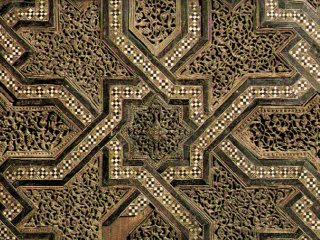
During these times of a much hyped clash of civilizations, it is perhaps instructive to look back at another such encounter. For several centuries, medieval Spain was the fault line that bore the brunt of the colliding tectonic plates of the Muslim East and Western Christianity. Yet this border zone of competing empires, under largely Muslim rule for over seven centuries, managed to flourish and develop to unparalleled heights of culture and scientific advancement.
My interest in al-Andalus was ignited after reading Leon L'Africain (Leo Africanus in the English translation), a carefully researched epic historical novel by the inimitable Amin Maalouf. It is the story of Hassan al Wazzan , a Granadan by birth who flees Spain to Fes with his family in the waning years of Moorish presence. Later, as a diplomat and explorer, he is captured and brought to Rome, baptized and becomes an adviser to the Pope. Most helpful however, has been the very readable historical narrative by Maria Rosa Menocal: Ornament of the World (see previous post) which provides an excellent description of the inner workings of Moorish Spain. The book provides a clear-eyed and objective analysis of what made al-Andalus work, warts and all. A friend thought that the book gave too much credit to non-Muslims for the achievements of al-Andalus. But that is exactly the point, is it not? The genius of the Muslim rulers of al-Andalus is that, in their tolerance and their love of knowledge, they allowed the different religious communities to thrive and contribute to the Andalusian culture and civilization.
To many Arabs and Muslims, mired in political and cultural stagnation, al-Andalus evokes deep sentiments of nostalgia for a mythologized world. To some, it also represents hope for the future. If our culture and religion were capable of helping create al-Andalus, the thinking goes, then we should be able to pull ourselves out of our quagmire. What redeeming values represented by the history of al-Andalus are best suited for this rescue operation depends on where on the Arab political spectrum you fall.
When fanatical fundamentalists speak of al-Andalus, it is to boast of conquest and empire. The irony is that, had the early Andalusian rulers been of that same mindset, al-Andalus would never have become an "ornament of the world". In fact during the centuries of Muslim rule, fanatic hordes would occasionally invade from North Africa, undoing what the more enlightened rulers had achieved. The end of Moorish Spain also came at the hands of fanatical hordes, this time Christians from the North bringing with them the horrors of the Inquisition.
The lessons learned from al-Andalus are that civilizational clashes need not be destructive provided that some modicum of mutual respect exists and that each side is secure enough to learn from the other. It is perhaps not by accident that the first rulers of al-Andalus were Umayyads from Damascus, a cosmopolitan city with its multiplicity of ethnic and religious groups. Who better than a Damascene to communicate with and engage the Christian and Jewish communities of the Iberian peninsula.
- Note: Another book of interest on the same topic: Shadows of the Pomegranate Tree. Another carefully researched work of historical fiction by Tariq Ali, a British, secular, leftist writer of South Asian descent. It is the saga of an Andalusian family in the last years of Moorish Spain. Also of interest from the same author: A Sultan in Palermo, a novel about another civilizational fault line. It is the story of the cartographer al-Idrissi in 12th century in the waning years of Arab Sicily during the Norman conquest.
3 comments:
As well as all the positive sentiments that you have referred to in this delightful post, I am afraid that the Andalus evokes in me a much darker and more cynical emotion.. The history of the Arab conquest of Andalousia and the way it ended can also be seen as a vivid example of what happens when a Nation becomes divided and its leaders lose sight of what is important.. The loss of that priceless jewell was the inevitable result of the selfishness, the in-fighting, and sheer greed of the leaders of the various factions.. You might even say history has in fact repeated itself, when the divied Arab nation, with its corrupt greedy leaders, and disenfranchised and disinterested population became an easy prey at the latter half of the 20th Century..
From Philip I [viarecta.blogspot.com]
Thank you Abu Kareem for shining the spotlight on a fascinating and enlightened part of our history. A dose of Andalusian nostaligia is just what we need to lift the spirit at these ugly times.
Philip I,
Now if we could only learn the lessons of our own history.
Post a Comment